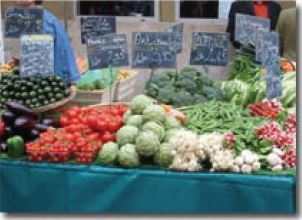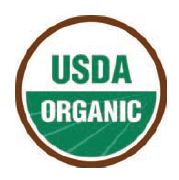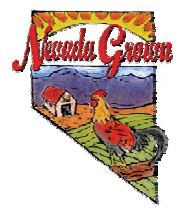Introduction
It is no secret that Nevada's economy relies heavily upon the entertainment industry; specifically gaming, accommodations, and dining. What may come as a surprise is that very few dining establishments in Nevada purchase their products from local (Nevada) suppliers. This is not due to a lack of interest on the part of dining establishments, nor is it due to a lack of supply by local producers; rather it is a lack of information that keeps many establishments from making local purchases. A recent market study (Curtis et al., 2006) found that nearly two-thirds of surveyed gourmet foodservice establishments in Nevada had never purchased local products. The chefs of these establishments did indicate, however, that they would be willing to either begin making local purchases or increase the purchases they currently make if producers are able to meet certain requirements. Although the gourmet chef market may not provide Nevada growers a single solution, marketing to chefs and restaurants may help to increase and/or expand sales.
This fact sheet details the above mentioned study, which sought to determine which product and supply attributes are most important to gourmet chefs, what their local purchasing patterns are, where they would like to purchase local products, and what they view as obstacles to making local purchases. Additionally, steps and strategies are provided for producers who would like to service gourmet chefs in Nevada.

Gourmet Chefs in Nevada
When approaching a chef or dining establishment in hopes of reaching a supply agreement, it is important to know the ownership of the establishment, the size of the establishment, the food service segment the establishment is associated with, and the level of autonomy the chef has in terms of making purchases.
The ownership of the establishment is more important than it may seem. A corporate restaurant, such as those in casinos, may be more concerned with avoiding waste and maximizing profit than with promoting local products. A smaller, private or locally-owned establishment, on the other hand, may find promotion of local products to be beneficial to its own status as a local business.
The size of the establishment, measured in meal units served per day, week, or month is also important. A large establishment may have quantity as its primary supply goal, while a small establishment may place more emphasis on unique products or services.
The food service segment the establishment is associated with determines the type of food the establishment serves. For example, a specialty restaurant may be interested in purchasing only lean meat for healthier dishes, while a traditional steakhouse may be interested in all cuts of beef, including marbled cuts with a higher fat content.
The level of autonomy the chef has in making purchases determines whether or not the chef can purchase the products he/she desires from whomever he/she wishes. Some chefs may have to go through the owner or manager or use a pre-designated supplier.

Product & Supplier Attributes
"Product attributes" refers to factors chefs may consider when inspecting individual products. "Supplier attributes" refers to factors chefs may take into consideration when approached by a new supplier. Chefs were asked to rank these attributes on a four-point scale, from not important to extremely important.
Taste, Quality & Freshness
All of the chefs in this study said that taste and quality are extremely important factors to consider when purchasing products for use in their restaurants. Regardless of the nutritional or business goals of the chef, his/her main goal is to provide high-quality, good-tasting dishes.
While there was not a consensus about the importance of a product's freshness, the majority of chefs said that freshness is extremely important. This is the type of attribute that is going to be important to many chefs, regardless of menu and preferences, as chefs do not want to serve food that is not fresh, nor do they want a reputation for serving food that is not fresh.
Marketability
A product's marketability designates how well the product will sell as a menu item. The chefs in this study were divided on the importance level of this attribute, but most agreed that it was a factor for producers to consider when selling to chefs.
Nutrition, Organics & Humane Treatment
About one-third of chefs said that nutrition, organic certification, and the humane treatment of livestock are extremely important, while the remaining two-thirds thought these attributes were less important. The importance of nutrition will vary from chef to chef and will probably depend on the type of food the chef's establishment serves. For example, a health-food restaurant may be more interested in lean beef or free-range organic eggs than a steakhouse or casino restaurant.

Price & Customer Cost
Price refers to the amount the chef will have to pay to obtain the product. The majority of chefs said price is not an important factor they consider when purchasing a product; if the chef wants a product badly enough, price will not be an issue.
Cost refers to the amount the chef's patrons will pay for the product as a finished meal in the chef's establishment. Chefs considered this to be less important than price. However, with both price and cost it is important to remember that their importance will depend on both the chef and the establishment. Chefs working at small restaurants may not have as large a budget as chefs at larger establishments. Similarly, if a chef works for an establishment that emphasizes affordable meals, he/she might place more emphasis on product costs.
Unique Items & Signature Dishes
The majority of chefs said that the presence of a unique or special quality is extremely important to them. Producers who feel they have a unique or special product should make sure that potential customers are aware of these qualities.
Many chefs and establishments serve items that are considered to be signature dishes or special to that chef/establishment. The majority of chefs agreed that being able to use a product as a part of a signature dish is extremely important to them. This is another case where knowing the chef's preferences is important; if a producer knows he/she has an ingredient of a chef's signature dish, he/she may be in a better position to work with the chef and may be able to negotiate a better price for the product.
Suggestions for Producers
- Work with other producers to increase quantity, variety, & extend seasonal availability
- Provide product availability information to chefs through newsletters, Internet sites, & samples
- Provide a knowledgeable contact person for chefs to discuss products & place orders
- Offer a variety of packaging sizes to accommodate chefs
- Choose a consistent & reliable delivery method
- Label all products with farm name & origin
Menu Applications
One-third of the chefs said that they consider a product's ability to be used in a variety of menu applications is extremely important. This will probably vary between chefs as well as the product. For example, a chef may be able to use micro greens in salads, as a garnish, and as a part of a sandwich or wrap. On the other hand, flavored goat cheese may only work for one dish. Producers may have to market specialty items to many chefs, while general items may be easier to sell in large quantities to one or two chefs.
Locally Grown & Personal Awareness
The majority of the chefs thought that it was not at all important to purchase products that are locally grown and/or produced. Producers should not find this troublesome, as this is likely to vary in importance depending on the chef and the establishment. A locally-owned establishment may be more likely to promote local products than a corporate-owned chain, franchise, or casino restaurant. Again, it is important to know the preferences of the person or establishment.
Chefs were also asked to rank the importance of personally knowing the grower/rancher/producer when purchasing items, and being personally aware of the growing process. The majority of chefs said knowing the producer is not important, and the majority also felt that being aware of the growing process is not important. However, a small portion of chefs felt both attributes are extremely important. As with the importance of locally grown products, this will depend on the chef and the establishment.
Consistency: Supply & Quality
Chefs were asked to rank the importance of a guaranteed consistent supply when considering a potential supplier. The opinion of this attribute was well-defined: the vast majority of respondents ranked a guaranteed consistent supply as extremely important. This result is not entirely surprising, as chefs don't want to have to complement a previously contracted supply or find a new supplier mid-season. The opinion of guaranteed consistent quality was identical, with nearly all of the chefs saying that consistent quality was extremely important.
Delivery: Year-Round, Timing & Method
Chefs were asked to rank the importance of a supplier being able to offer year-round availability of products. Year-round availability differs from consistency in that year-round availability implies that a producer will be able to offer products all year, while consistent supply implies the producer will supply products on a regular schedule. The chefs had mixed feelings about year-round availability, but the majority felt that this was a less important attribute. This is especially important for small producers, who may not be able to provide year-round availability. Small producers may consider supplying a chef or establishment with a seasonal variety of products. For example, a grower may supply an establishment with squash in the spring, berries in the summer, and apples in the fall and winter.
The majority of chefs felt that the timing of delivery is a very important supplier attribute. This shows how important the timing of delivery is to chefs and how important it is for suppliers to consider delivery timing when approaching chefs and/or restaurants. Delivery method is also extremely important. This illustrates how important it is to chefs and establishments that consistent and reliable delivery methods be used.
Tips For Working With Chefs
The following tips for working with chefs are provided by the Portland Chapter of the Chefs Collaborative (Farmer Chef Connection).

- Commitment: Restaurants need to be somewhat consistent in their purchasing patterns. When a chef commits to buying a certain amount, the chef anticipates it will be delivered as ordered.
- Delivery schedule: Chefs depend on the arriving product. Work with your chef so the restaurant can have a steady stream of fresh products during the week. Try to establish a delivery system that works for both the kitchen and your schedule. Know your restaurant's busy times and plan your calls and visits around these times, not during them.
- Sell what you can deliver: Make sure you have the appropriate permits to sell to restaurants and retailers. The chef is expecting a certain quantity of a specific item. If the product or quantity is different than what you offered, call in advance to make sure the chef still wants it.
- Sell your product: Free samples are often a good idea. Offer your product when you first stop by the restaurant (be sure to call in advance) and encourage the chef to taste the difference with your product. Offering samples at farmers markets is also a good marketing tool.
- Know your customers and their customers: Eat in the restaurants where you deliver. This is the equivalent of a chef coming out to see your operation, and also gives you the opportunity to see how your product is used.
- Be professional: Remember to be consistent in your work and with your product. Assist the person receiving the delivery by collecting your boxes, be on time and courteous, and prepare invoices ahead. Call if you will be late.
- Billing: Like any other businessperson, you have a right to be paid on time. First time deliveries may be paid in cash, but it is far more efficient for everyone to establish an account with the restaurant.
- Specialize and diversify: Diversify the product that you offer and make yourself unique. Research the market so you know what others are growing and where the holes are. Talk to your chef about what they would like to see on their menus in the future. Be creative!

Where Can I Find More Information?
The Chefs Collaborative is a national network of more than 1,000 members of the food community who promote sustainable cuisine by celebrating the joys of local, seasonal, and artisanal cooking. (Chefs Collaborative)
The Portland Chapter of the Chefs Collaborative and Ecotrust, a Portland, Oregon-based non-profit organization, sponsors annual events for local farmers, ranchers, fisherman, and buyers in an effort to create and sustain relationships between both sides of the supply chain. Information about these events, as well as other relevant information, can be found at Farmer Chef Connection and Eco Trust.
The Chef's Garden, Inc. is the leading grower of artisanal products in the United States and supplies chefs worldwide. Proponents of sustainable agriculture, The Chef's Garden strives to engage in a close working relationship with both producers and chefs. (Chefs Garden)
Home Grown Wisconsin is a cooperative of organic farmers who raise vegetables, fruit and herbs for gourmet restaurants in Wisconsin and Illinois. Home Grown Wisconsin has been in operation since 1996 and serves as an example of what producers can accomplish when working together. (Home Grown Wisconsin)
Nevada Grown is a marketing program designed to assist Nevada agricultural producers and their customers to bring communities and people together and to support local growing and the consumption of Nevada products. Producer membership information can be found at Nevada Grown.

Country Natural Beef is a cooperative of cattle ranchers in Oregon and several other western states that produce high-quality, humanely-raised beef cuts for retail distribution. Country Natural Beef strives to maintain the independence of its member ranches while profitably marketing quality beef products. (Oregon Country Beef)
The North Central Initiative for Small Farm Profitability published a report similar to this one in June 2003. The entire report can be found online at Farm Profitability
References
Center for Integrated Agricultural Systems, “Home Grown Wisconsin: Marketing Fresh Produce Cooperatively.” College of Agricultural and Life Sciences, University of Wisconsin, Madison Research Brief #69, February 2004.
Curtis, K., M. Cowee, M. Havercamp, and R. Morris, “Nevada Supporting Nevada Initiative.” University Center for Economic Development (UCED) Publication 2005/06-24, March 2006.
Food Processing Center, “Approaching Foodservice Establishments With Locally Grown Products.” Institute of Agriculture and Natural Resources, University of Nebraska, Lincoln, June 2003.


